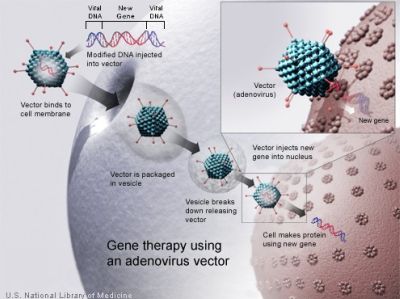Treatment
There is no current cure for cystic fibrosis, but treatments are available to ease the symptoms. A combination of medication, physiotherapy and a strict diet are used in most patients.
Medication
People with CF take several types of medication to relieve the symptoms caused by the build up of mucus, including: 
- Antibiotics: Can be used to fight infections caused by build up of mucus.
- Bronchodilator drugs: Relax muscle in airways of lungs helping the patient to breathe more easily.
- Steroids: Used to reduce swelling.
- DNase: Helps the breakdown of mucus in the lungs so it easier to cough up.
- Pancreatic enzymes: Used to replace enzymes which can’t be secreted due to mucus clogging the digestive system. Taken before every meal to help the digestive system break down food.
Physiotherapy
Physiotherapy is carried out daily and helps to clear mucus build up in the lungs so that it can be coughed up.This prevents infection and also maintains optimal respiratory function. All patients are given an individual physiotherapy regime according to the progression of the disease and changing symptoms. Airway clearance techniques involve:
- Breathing control - including deep breathing, forced expirations, and exercises with the emphasis on inspiration
- Postural drainage - involves positioning of the patient so that the most effective clearance of mucus from the airways can be achieved
- Chest clapping - performed with cupped hands over the area being drained
- Positive expiratory pressure masks - used to open up obstructed lung and allow air to move behind secretions to assist in mobilising them so they can be cleared
- Physical activity - regular, vigorous exercise is beneficial such as swimming, cycling and jogging
Nutrition
 Due to the fact that digestive enzymes are greatly reduced in CF patients, a high fat and high carbohydrate diet is recommended.
Due to the fact that digestive enzymes are greatly reduced in CF patients, a high fat and high carbohydrate diet is recommended.
Cystic fibrosis patients stick to a strict diet to compensate for loss of fat and protein in stools due to lack of digestive enzymes. If patients are well-nourished they can also withstand chest infections better. Vitamin supplements are also required as vitamins aren’t absorbed very well.
Images of Medication https://www.flickr.com/photos/wtkn/484913345/ and Nutrition https://www.flickr.com/search/?q=carbohydrates+pasta courtesy of Flickr under the creative commons licence
Lung Transplant
This is only used in patients with severe lung problems caused by cystic fibrosis. Patients who have mild to moderate lung problems don't receive a lung transplant as the risks of the procedure may outweigh the benefits.
This procedure involves removing the unhealthy, diseased lungs and replacing them with healthy ones from a deceased donor. Sometimes a procedure called a living-donor lobar lung transplant is also carried out on patients waiting for a full lung transplant. In this procedure, the lower lobe of one lung in each of two living donors is transplanted into the CF patient. This is less common than full lung transplants as it requires two living donors.
This kind of treatment isn't ideal for CF and can have many complications. Experts aren't sure whether it helps children with cystic fibrosis to live longer.
Future Treatments
Research into new treatments has revealed that gene therapy provides hope for treatment in the future. Gene therapy in CF involves replacing the non-functioning CFTR gene with a working gene. This is achieved by inserting the CFTR gene into a vector (usually a viral plasmid) and injecting it into the target tissue. It can then infect the cells to express the therapeutic gene (see diagram).

Image of gene therapy using an adenovirus vector courtesy of Flickr https://www.flickr.com/photos/jamlos/2734418031/ under the creative commons licence
This treatment would be extremely beneficial for CF patients, as treatment currently used focuses on supressing symptoms of the disease, whereas gene therapy would correct the underlying cause and therefore may provide a cure.
However, research into gene therapy has had limited success to date; much progress is required before this therapy could be successfully used in patients.
